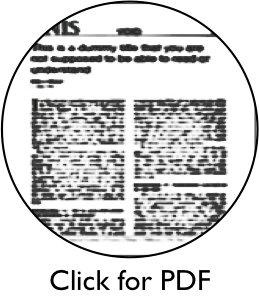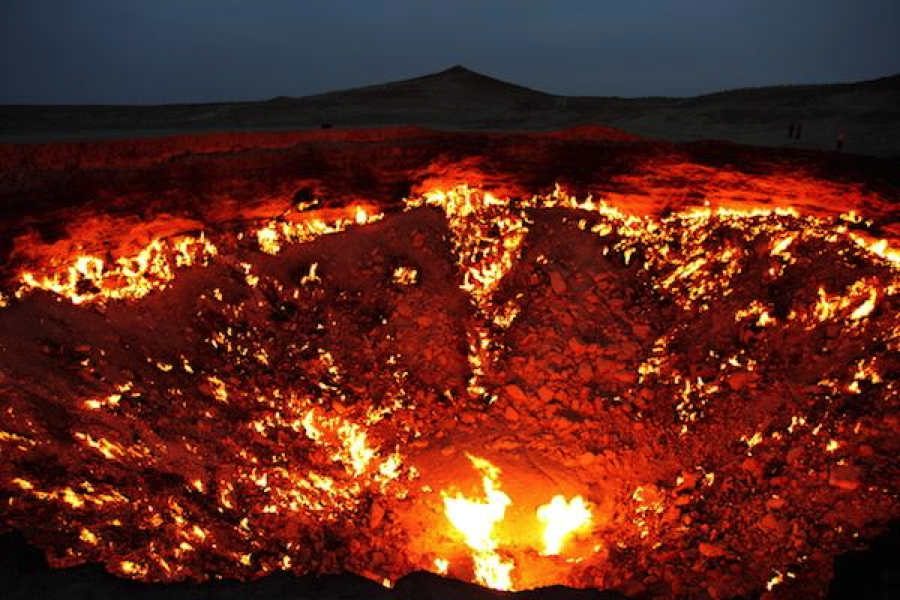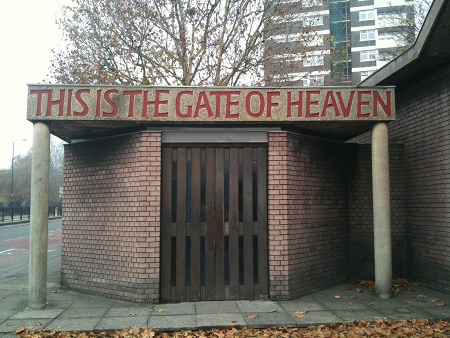
Tweet
January 20, 2015
Proceedings of the Natural Institute of Science | Volume 2 | SOFD 1 PRE-REG
Neural correlates of people waiting to get into Heaven
Neuroscience Jesus*,1
* - Twitter: @EEGesus
1 - Institute of the Divine, Department of Post-Terrestrialssubmitted: October 20, 2014
accepted: October 30, 2014

[Note: This is a pre-registered article. The scientific question and methods of this article have been reviewed and accepted. The eventual results of this experiment (which are not yet available) have been accepted “in principle”, and will be published when made available by the author(s). See this article for more information on pre-registered reports.]
The entrance into Heaven is small. Literally, small (Matthew 7:13) (see Fig. 1). It would be the equivalent of a doggy door compared to the airplane hangar that riddles the path to Hell (Fig. 2). Because of this bottleneck at the Heavenly Gates, there is much downtime. In particular, there is enough downtime to assess people who have Ascended.

What makes such a rare person? In Christianity, it is a popular myth that following The Ten Commandments will lead you to Heaven. Unfortunately, this is not the case. The verses spoken about The Ten Commandments are merely some things God shouted out, which were seemingly translated into rules (Exodus 20:1-17). There is no mention of getting into Heaven if one follows these rules. In fact, there is really no mention in the bible of any explicit thing that allows you entry -- neither going to church, nor being a good person. Even believing in God will not provide guaranteed entry.
We know there exists no explicit guidelines for getting in. But for those who are Chosen, why were they chosen?
Like many small populations in life, there are physiological factors that correlate highly with ability. One particularly important factor is the activity of brain waves, specifically alpha waves. Expert chess players, for example, elicit less alpha desynchrony (or rather, more relative alpha activation) than novice chess players during a memory game involving chess pieces (Grabner et al., 2006). This finding indicates that irrespective of IQ, experience or previous knowledge fine-tunes the ability to perform. This “expertise effect” has been cited in many different articles, with the same underlying principle: it is not necessarily about the standardized expectations you meet (e.g. IQ, or following The Ten Commandments) but rather the experience that leads you to heightened performance (e.g. playing chess forever, or constantly squeezing through doggy doors).
Assuming there is a contrast between those who enter Heaven and those who reluctantly walk the airplane hangar-width road to Hell, I hypothesize there exists a sort of expertise effect when comparing Chosen People to The Damned. To test this, I will use imagery of small and large entrances along with long and short lines. If The Chosen are so good at fitting into tiny entrances and waiting long times to get through said entrances, there should be neural activation in the form of alpha that is similar to baseline. Alpha activation should be greatest during some sort of resting task, where all participants are effectively doing “nothing,” or rather, engaging in little to no cognitive tasks (with the assumption that you cannot bring your iPhones with you in the afterlife). When performing any cognitive task, any participant should elicit less alpha (the less alpha activation, the less you are in synchrony with your alpha baseline, indicating greater neural activation). During the small-or-large-entrance discrimination, Chosen People should elicit greater alpha when compared to The Damned, since entrances of any size should not elicit less alpha (or rather, greater alpha desynchrony) due to their familiarity with long lines and small entrances. In comparison, The Damned should elicit greater alpha desynchrony than compared to baseline after viewing small entrances and/or long lines due to greater stress, related to uncertainty of getting into Heaven.
References
Grabner, R. H., Neubauer, A. C., & Stern, E. (2006). Superior performance and neural efficiency: the impact of intelligence and expertise. Brain Research Bulletin, 69(4), 422–39. doi:10.1016/j.brainresbull.2006.02.009

Proceedings of the Natural Institute of Science (PNIS) by https://instsci.org/ is licensed under a Creative Commons Attribution-ShareAlike 4.0 International License.
